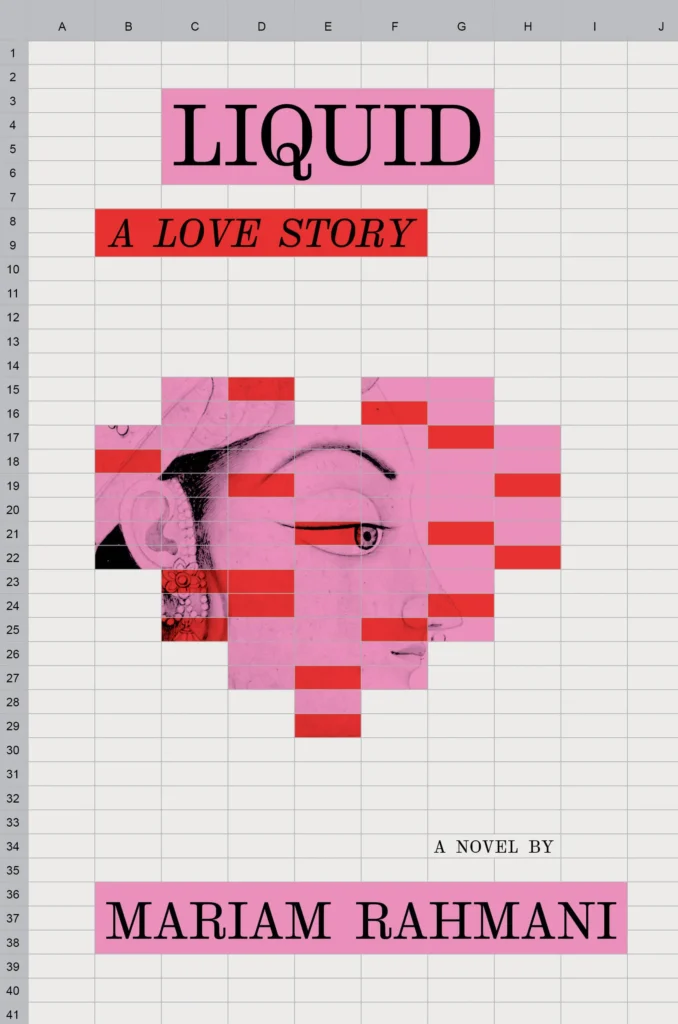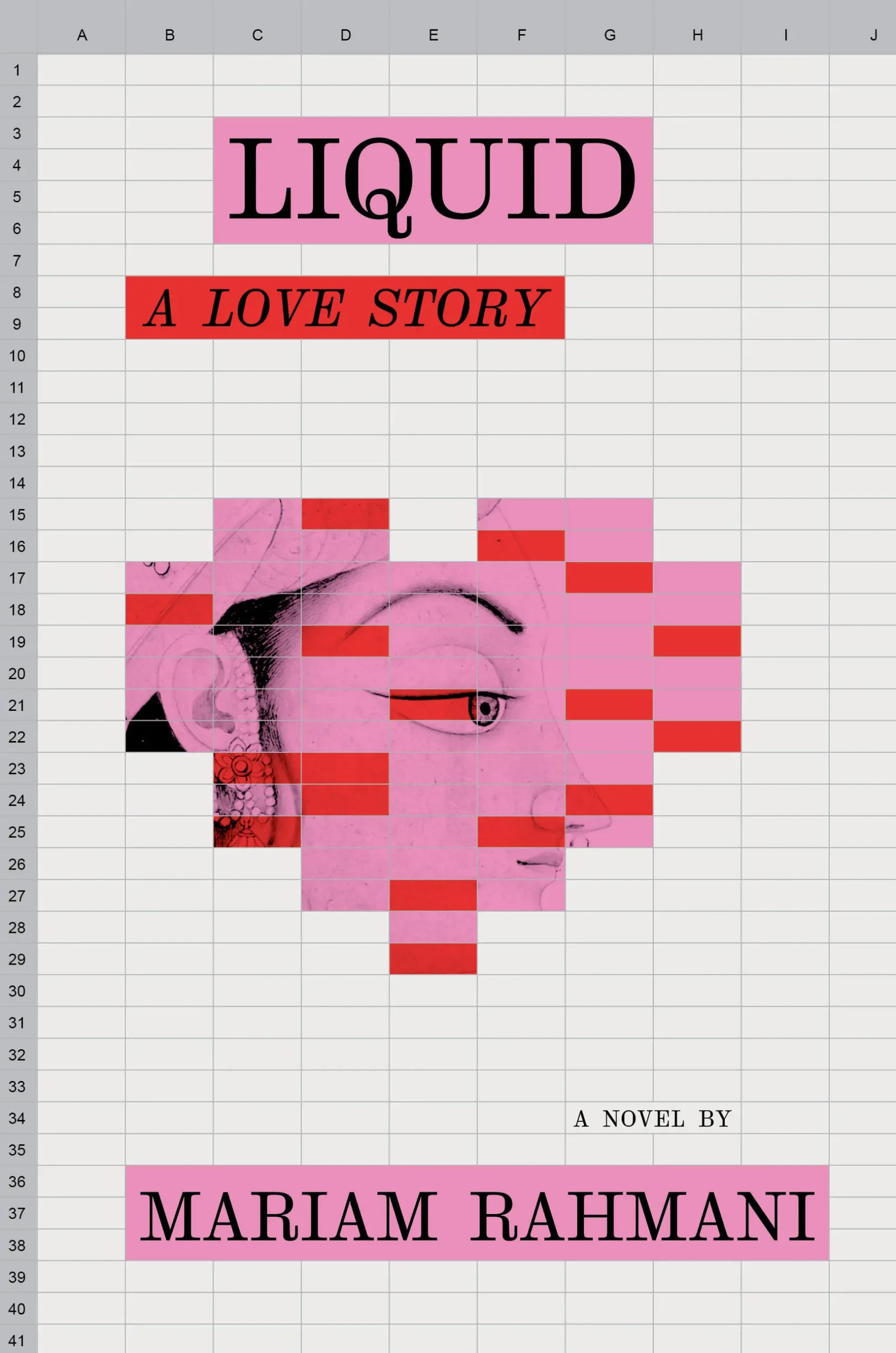
Sarah Faux (left) and Mariam Rahmani (right)
Friends for over a decade, MARIAM RAHMANI and SARAH FAUX have been connecting for years about their respective artistic practices. They recently spoke over Zoom for The Common: Sarah from her painting studio, and Mariam from her office in Vermont. In the following conversation, they discuss Mariam’s novel, Liquid, published earlier this year, which centers a queer Muslim woman who navigates 100 dates in one summer. They speak on how translating others’ work has served Mariam’s own voice in writing, and how messiness and uncertainty are at the heart of good literature.
Sarah Faux (SF): It’s very special to get this opportunity to interview you after you interviewed me at my painting exhibition in April! We had the unique opportunity to release two projects simultaneously, and now we are about six months post-release of your excellent novel, Liquid. I’m curious how you’re feeling a few months later?
Mariam Rahmani (MR): It’s actually a relief that I’m not thinking about it that much anymore. I had a really busy summer. I had to turn in another translation, a full book manuscript. I also got back to an old book I had buried, and researched a new book I started two years ago, soon after Liquid got acquired. It’s kind of nice, because my mind is occupied with new questions. And now this novel exists in the world and has a life of its own. I think that the beauty of the relationship between an author and a reader is the fact that they will never meet and never speak to each other, and really never know of each other outside of that work.
SF: Well, except for us right now. But I get that, and also at the same time, do you feel like your book might be filling a void that you observed in literary fiction? Is Liquid directed towards a specific reader that might otherwise be neglected?
MR: I don’t think it’s quite filling a void, because I just don’t think any book can do that much work on its own. But I think that one of the caverns I was trying to speak into is the kind of messy Muslim who’s shown here, someone owning that identity in a kind of blasphemous way.
I also see a lot of politics around relationships with one brown partner, often a brown woman or brown femme person, and a white cis man. There’s an easy read of those relationships in certain circles in this political moment as undesirable. I don’t necessarily disagree with that, but I was interested in the gap between people’s politics and their personal lives. I was thinking about this tenet that the personal is political, but also questioning: Is every individual choice we make representative? I am not trying to say that the critique is wrong. I’m interested in how it exists alongside the reality of how people are. This book asks whether love exists outside of our social structures, and therefore, really, whether it exists.
SF: You can see that playing out. Your protagonist is an academic studying marriage conventions in the East versus the West, and she’s pulling from several different sources. She’s designing a class based on rom-coms, and she’s also reading the work of a radical Iranian poet and filmmaker, Forugh Farrokhzad. So she’s studying the tension between romantic love in a vacuum and in a society that constrains one’s actions. And she’s setting out on 100 dates to try to marry rich. So she’s scientifically approaching love, although maybe she’s not actually looking for it…
MR: Well, she claims that she’s trying to be practical, and she’s looking for companionship and structural support, right? That’s why she wants this person to have enough money to compensate for her lack of paid career options. So, it’s a question that the book asks and doesn’t answer. There’s this suggestion that we play the roles that are given to us. To what extent do we willingly adopt those scripts? In particular, the script of heterosexuality.
SF: These ideas are complicated by queerness in the novel. There’s not a lot of discussion of her queer identity, but her sexuality is fluid. There aren’t many rom-coms about two women, but it’s almost like your protagonist maps those heterosexual scripts onto her queer relationships as well.
MR: Yeah, because of these financial constraints. You see it getting coded as a masculine position, to be the person who has all the money. Then the femininity that she’s choosing projects that masculinity onto the people she’s with. But what’s interesting about what happens to her in Iran is that actually she ends up dating someone who’s very femme, so it messes up her own ideas about the structure of gender.
SF: She seems to be part of a more elite social class in Iran than in L.A. She’s potentially coming into money there and has wealthy relatives.
MR: Yes, on the one hand, just because she has dollars. Even a little bit of money is going to translate to a lot of toman. She also has a family with a higher class position in Iran than she has in the US. Then there’s the woman she’s dating, who’s an independently wealthy artist. Masculinity and money don’t stay so neatly aligned.
The other thing is, it’s not an easy, celebratory reading of queerness; she has a femme lover, and she also comes up against other forms of othering in Iran. She’s not fully blood Iranian. She is half Indian, half Iranian, which is a gesture to the first novel in Farsi. But the half Indian part becomes a sticking point in Iran.
SF: Her lover makes a comment about her skin tone.
MR: Exactly. So there are these moments of racialization—India as a further east to Iran, this orientalization of Indianness. There aren’t any easy answers.
SF: Now I’m thinking of your first translation, In Case of Emergency. We started with the idea of the messy Muslim, and in that novel, there’s a woman who, during an earthquake, is looking for a drug fix. I’m wondering if you saw parallels there in terms of asking complex questions without easy answers? Also, if translating it influenced your writing?
MR: Yeah, in terms of writing practice, translating In Case Of Emergency really opened up writing dialogue. Crass dialogue, vernacular…That practice bled into my own writing. Actually, the act of translating in general opened to me the possibility of being many different writers. Liquid isn’t representative of my typical style.
SF: In Liquid, there are two very different sections with different voices, like two parts of the narrator’s self. There’s her in LA, and her in Tehran. The novel changes from this pithy, fast-paced dating life to super-slowed-down, poetic, sparse vignettes as she witnesses her father in the hospital. As the style shifted in Tehran, I noticed there were directives repeated, Watch the nurses do this, watch your mother do that. She’s a witness, and the reader is too. How did you conceive of that stylistic shift?
MR: I was interested in Third-Worldism and a critique of US Neo-Imperialism. So the restraint that happens in Iran shows how it is harder to be easy breezy there, in part because of the US sanctions. For example, she comes up against the very real impacts of that on health care in Iran, the real impacts on the economy. Part of that isn’t political. It’s the situation she’s in. She gets pulled to Iran because her father is in the hospital, and she has to contend not only with his mortality and mortality in general, but with family dynamics, the kind of failure of her family. So part of it reflects her vulnerability at that particular moment in her life.

SF: Now I’m curious what is stylistically shifting in your current projects. Can you say more about that?
MR: Well, I think that Liquid is really concerned with the contemporary. And, you know, form needs to reflect content.
SF: How very modernist of you!
MR: I really don’t have a post-modern view on anything. Modernism got it right. Ok, so these other books that I’m working on aren’t concerned with contemporary life in that way. So the tone and the style reflect that.
SF: And you’ve returned to the novel that you wrote before Liquid?
MR: Yeah, I finally got the balls to open those old drafts. It’s about this insular Iranian-American community in Ohio, and the relationship between two families as expressed through the friendship between two girls.
SF: Do you feel more freedom to write into different areas now that you have a debut novel that is being celebrated?
MR: Well, I have given myself permission to take up more space. For a lot of writers, that is actually the gift that they give themselves. I knew going into Liquid that I was buying time to some extent. There was something about my prior book that wasn’t exactly where I wanted it, so that book wasn’t shopped around to editors at all. I needed time. It wasn’t ready. But my suspicion was that why it wasn’t ready was different than why American editors would think it wasn’t ready.
SF: Sounds like you needed to see for yourself, on your own terms, what that novel needed.
MR: Exactly. I wanted to be more confident in my own editorial eye, without having the pressures of a so-called debut put on that book. That book is a lot closer to me in some ways.
SF: It’s coming out of some of your own experiences in terms of where you grew up?
MR: Yeah, the milieu I grew up in. Of course, there are always departures, but it is a book that, for one reason or another, is more intimate. Now I have a better understanding of what that intimacy means, and precisely when it needs to be betrayed to make a good novel.
SF: While this first manuscript was on hold, how long was the writing process for Liquid?
MR: Relatively short. Three years from my putting the first word on the page to it actually being a published book. So it was pretty quick, and that’s not enviable in a lot of ways. There are issues in that book that are very dear to me, sticky questions about agency. Some of it, of course, is informed by personal experience, and some of it is just the really ugly or knotted stuff that I felt people didn’t want to talk about.
SF: Your protagonist has a lot of hilarious hot takes on race, class, and gender. As she’s dating, she’s constantly evaluating the power structures circumscribing her and her dates.
A lot of femininity is about erasure, and so I wanted to put that erasure on the page.”
MR: Yes, and often her takes are problematic. The narrator’s claims are not always mine. Because again, it has to be serving the plot. I think about genre a lot when I’m writing. But all that to say, the moments in those late edits where I knew “No, I’m not going to give up this line,” or “I’m not going to give up this phrase,” that kind of messiness that a good editor wants to take out because their job is to streamline, that is actually where the art of literature lies.
SF: That messiness makes me think of the narrator’s adventures with removing or covering her body hair. Your visceral descriptions of her grooming create a certain friction in relation to her quite cerebral narration. When she’s waxing or tanning or fiddling with tights in a public bathroom, these moments are so vulnerable, private, and awkward.
MR: That was really important to me, that we see the literal structuring of femininity based on current cultural mores. A lot of femininity is about erasure, and so I wanted to put that erasure on the page. I wanted us to see her literally erasing the hair from her body. I wanted us to see her drawing her eyeliner. So much of femininity is about erasing one thing to add another.
SF: Like makeup, you’re just drawing a picture of your face on your face.
MR: Exactly, and that’s always been strange to me, and I use makeup. That’s one of those tensions I’m interested in, like what does it mean to not only continue to use makeup but actually to take a lot of joy from it. And also to recognize the absurdity that, historically, it has not been a source of joy. The body here actually was an image that I had written about before. But then, when I was writing Liquid, I knew, oh, this is the time that it’s meaningful.
SF: And her body hair literally turns into script on wax strips, right? So there’s a way in which the gendered structures are getting literalized, like, the hair removal is turned into the written word.
MR: Yeah, exactly.
SF: I’m also thinking about your title, which I thought about one way initially—sweat and sex. It’s a novel about dating after all. But then the word liquid shows up very pointedly throughout. There’s a relationship that’s as thin as a thread of liquid, or liquid drips out of a fruit. Or there’s talk about liquid assets—what’s liquid, what’s illiquid. So I can read it as both symbolically about precarity and late-stage capitalism, everything becoming more liquid, or I can read it as an optimistic nod to liquid transformations of self.
MR: Well, the title is meant to be troubling and joyous and critical, and you know, all the things all at once. So my primary concern when I was thinking of a title was that I wanted it to have a hard financial meaning, as well as texture, some kind of sensation, whether it was smell or sight. The irony is that what she gets is, in fact, an illiquid asset, not a liquid asset. The novel is about her own liquidity and fluidity. And some of that is beautiful, and some of it is very dangerous, like the way that she shapeshifts when she’s dating.
I was also interested in the ways a liquid substance decreases as it flows along the surface, because it leaves something behind. The friction is going to keep something for itself, and the original liquid is actually lessening. And she does have to take something from herself, the way that she’s trying to move.
SF: Also, as a sort of older coming-of-age novel, there are some aspects of her identity becoming more fixed. But I appreciated that she is unable to be completely pinned down. It’s very typical for every attribute of a character to be tokenized and exploited. Your protagonist is permitted to be complex, and we don’t have to tie a neat bow around her at the end.
MR: Thanks. That’s the trick of the ending. It’s so pat that it’s actually not meant to be read genuinely. It’s supposed to draw attention to the performance of the script that’s been happening the whole time, and to ask the question of whether she feels something or if she’s continuing to fulfill a role.
SF: Yeah, she’s had a revelation, but you’re like, “did you?”
MR: Similarly, for the reader, my goal would be that you close the book, and it’s actually kind of slippery. Every time you think of one claim, you can think of the counterclaim in the other section. I wanted to write a text that unwrote itself as you read it.
SF: I love that. Ok, so there’s one last thing I wanted to ask you. I saw Liquid compared to Celine Song’s film Past Lives. And that film is a real tear-jerker, particularly at one moment. I saw it in theaters, and everyone cried at the exact same time. So the film is quite different in overall effect from your work.
MR: Yeah, that destroyed me.
SF: But then the film is playing with this same feeling that keeps coming up, of multiple selves, memories of a past self…And there’s the boyfriend character from elementary school. He’s sort of a flat character, an archetype. Again, this question of how willingly are we playing into scripts? But Song ends on genuine emotion, versus how we were talking about the ending of Liquid. So I was curious how you felt about that comparison.
MR: It’s flattering. I think it’s a wonderful movie, so it’s certainly flattering. But I think what we’re getting at is this fundamentally human experience, at least in terms of what it means to be a human today. Of having this Rolodex of different versions of yourself, and especially for a certain kind of middle-class subjectivity that felt like they had options.
SF: Yeah, like your family had the option to move or you have the option to live on either coast or invent a new version of yourself at will.
MR: Yeah, and in particular, American culture is obsessed with this idea of self-invention. Even just the phrase “self-made man.” So I think in both of these contexts, the bi or multicultural experience, or the bi or multilingual experience, it’s both real, and it’s a metaphor for that feeling of multiplicity that a lot of people have.
SF: I think that’s why everyone cries at the same time. There’s not a person who doesn’t have a way of relating to that feeling of rupture at some stage in life.
MR: Exactly, it might be leaving home from the Midwest to move to New York.
SF: Or just getting older, losing your illusions.
MR: And also, life often doesn’t meet our younger expectations, right? And part of the challenge, of course, is learning how to adjust and learning to see the beauty in that. We see some of that happening in Liquid, and some of it is her just learning to cope with her reality versus what she thinks the world owes her.
Mariam Rahmani is a writer and translator. Her recent novel, Liquid, has been shortlisted for the Center for Fiction First Novel Prize. Her translation from Farsi of Mahsa Mohebali’s In Case of Emergency was a New Yorker Best Book of 2022, while her translation of Farzaneh Milani’s biography of the midcentury poet Forugh Farrokhzad is forthcoming in fall 2026. Her work has appeared in Granta, New York Magazine, n+1, and elsewhere.
Sarah Faux was born in Boston, MA. She lives and works in Brooklyn, NY. Faux has held solo exhibitions at Hales Gallery (NYC), M+B (Los Angeles, CA), Capsule Shanghai (Shanghai), and Stems Gallery (Brussels), among others. Faux has been the recipient of many residencies and grants, including an Institute Residential Fellowship at the Clyfford Still Museum (2024), a Pollock-Krasner Foundation Grant (2023), and artist residencies at Yaddo.




